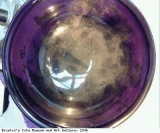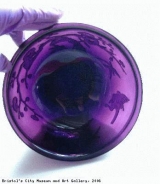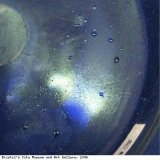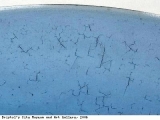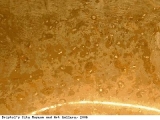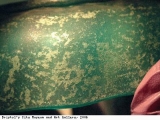Conservation
A generous grant from the Museums, Libraries and Archives Council has allowed Bristol’s City Museum and Art Gallery to preserve and increase access to its important collection of Chinese glass.
The collection is one of the finest outside Asia and has over 300 pieces, but a survey in 2003 showed that Bristol’s Chinese glass collection urgently needed conservation:
most items were dusty and much of the dust was sticky from pollution
fingerprints marked the surfaces
old labels had left glue behind
some glass on display was becoming damaged because of large changes in temperature and humidity within the display cases
glass that was in store was difficult to get at because the cabinets were full
The most serious problem for the objects was that many had become chemically unstable. This meant that some had lost their gloss, some were greasy with salty ‘tears’ which came from the breakdown of chemicals in the glass. Some pieces had very fine pits in their surface from the corrosion caused by these ‘tears’. A few which had become corroded long ago had flaking surfaces or a fine network of cracks, known as ‘crizzling’.
One reason that some glass was unstable was because when it was made in the late 17th and early 18th century the proportions of the ingredients were not quite right. Research has shown that it was too alkali or that there was not enough lime in the mixture. This was because craftsmen in China were experimenting with new glass recipes, some introduced by European missionaries with glass-making skills. They were trying to create new, luminous colours and effects, such as deep reds and blues. Most of the crizzled glass in Bristol’s collection is a deep, transparent blue, but there are also turquoise, red and amber-coloured pieces that are crizzled.
The grant received from the Museums, Libraries and Archives Council has enabled conservation of the glass:
dust, greasy residues and fingerprints were removed by washing the glass with a neutralising chemical solution and then drying thoroughly
new storage cabinets make it easy to see and reach the glass and have stopped changes in the humidity and temperature
new display cases will also have environmental control
These measures will considerably slow the corrosion of the glass in this special collection. The corrosion cannot be stopped entirely, so the glass will need to be checked and treated regularly.
